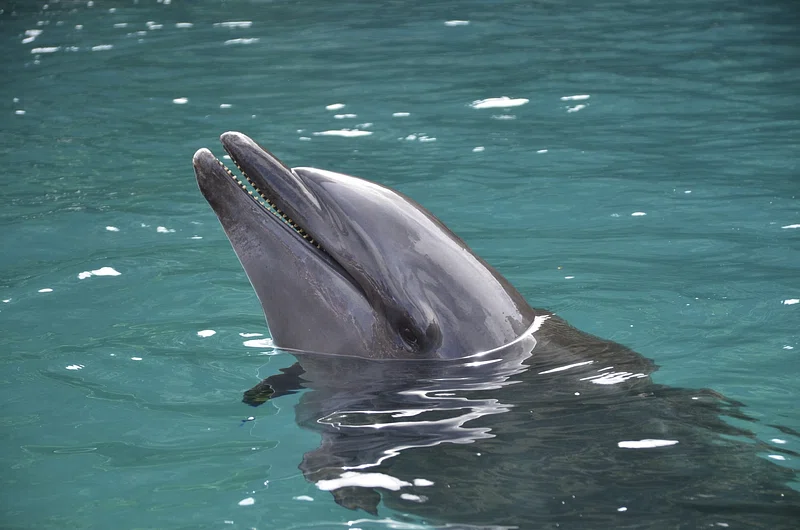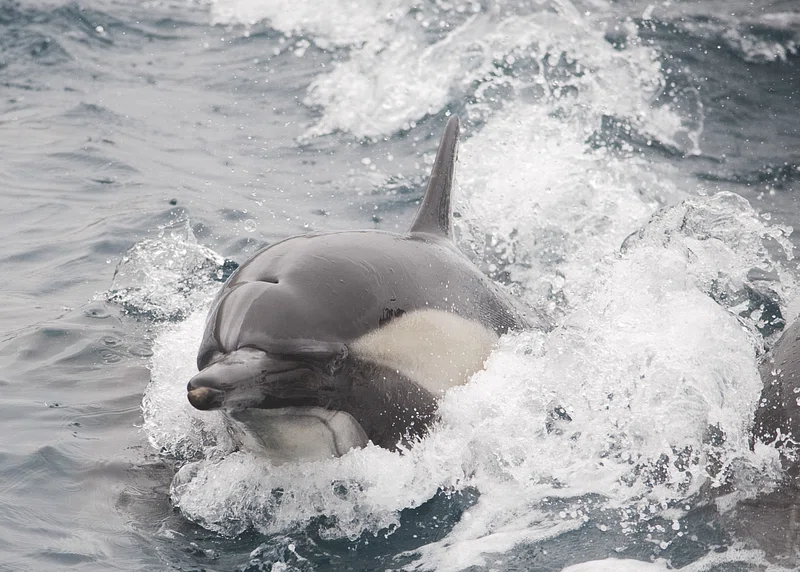
How Are Dolphins Evil? Dolphins are not inherently evil; however, there are isolated incidents of dolphins exhibiting aggressive behavior. Such behavior can occur when dolphins feel threatened, stressed, or provoked.
Dolphins are generally regarded as being intelligent, playful, and sociable despite these uncommon incidents.
Their intricate communication and problem-solving skills are often investigated, and they are held in great regard in marine conservation initiatives.
Dolphins are revered for their beautiful and alluring appearance in the wild and are essential to the biological balance of the oceans.
All things considered, even though there are rare cases of aggressive behavior, it is inaccurate to characterize dolphins as being fundamentally bad. Rather, in the marine world, they are still thought to be amazing and cherished animals.
Table of Contents
Understanding Dolphin Behavior
Playful And Intelligent Nature
Dolphins are renowned for being intelligent and playful animals. They display a variety of actions that point to a high degree of cognitive capacity.
Their lively demeanor is apparent in their interactions with other aquatic species and in activities such as playing with seaweed and riding waves.
Dolphins are incredibly intelligent and adaptive animals who use their intelligence to solve issues and adjust to shifting situations.
Complex Social Structures
Dolphins establish close ties and sophisticated interactions inside their pods, living in socially complex environments.
Sophisticated communication techniques within these social systems enable them to efficiently collaborate in hunting and mutual defense.
Their intricate social systems are crucial to their survival in the wild because of their strong social ties and cooperative nature. [How Are Dolphins Evil?]
Predatory Instincts
Dolphins are social and playful creatures, but they are also predators. They hunt with skill, taking down a wide range of fish, squid, and other aquatic animals.
Through the regulation of prey species populations, their predatory instincts are essential to preserving the equilibrium of marine ecosystems.
Even though they could come off as nice, it’s important to recognize that they are predators and that this is a fundamental part of their behavior.
See Also: Why Are Male Dolphins Evil? The Dark Side of Dolphin Behavior
Dark Side Unveiled: Aggressive Behavior
Aggression In The Wild
Even though dolphins are typically thought of as intelligent and gregarious animals, there have been reports of hostility in the wild.
Competition for resources, territorial disputes, or the establishment of social hierarchy within pods in the wild can all be the cause of such behavior.
In order to get the right to mate in the wild, male dolphins may put on aggressive displays, particularly during mating season. But it’s important not to oversimplify their nuanced actions by calling them “evil.”
Dolphins in the wild create close ties within their pods and also display cooperative and altruistic behaviors.
A complex viewpoint that takes into account the range of variables impacting their behavior in the wild is necessary to comprehend what they are doing. [How Are Dolphins Evil?]
Instances Of Violent Interactions With Humans
Dolphins are thought to be friendly creatures, yet violent conflicts with humans have been documented.
These occurrences frequently take place in captivity, when the tension and artificial surroundings can lead to aggressive actions.
Dolphins in marine parks have been known to bite or ram trainers as well as guests, exhibiting a darker side to their nature when kept in artificial environments.
Violent Interactions With Other Marine Life
It’s crucial to stress that calling dolphins “evil” is both anthropomorphic and untrue. Like any wild species, dolphins are generally clever and gregarious, yet they can also behave aggressively with other marine animals.
Usually, rivalry for territory, resources, or the creation of social hierarchies is what motivates these interactions.
Dolphins may act aggressively toward other animals while they hunt or when they are defending their territory.
It’s crucial to understand, though, that these behaviors are a normal aspect of marine ecosystem dynamics and do not always reflect moral intent.
Viewing such encounters as the product of innate characteristics molded by evolutionary processes is a more correct interpretation.
Gaining insight into these actions contributes to a more educated and fair assessment of dolphins’ place in the intricate marine food chain. [How Are Dolphins Evil?]
See Also: Are Female Dolphins Evil? Unveiling the Truth
Manipulative And Cunning Characteristics
Deceptive Hunting Techniques
Dolphins are renowned for their cunning hunting methods, employing astute tactics to capture their prey.
They frequently cooperate in groups, encircling fish with their cunning to keep them from escaping.
Dolphins are able to successfully control their prey’s behavior and carry out a hunt by using coordinated motions. [How Are Dolphins Evil?]

Manipulative Interactions With Other Species
Dolphins are known for their crafty interactions with other animals, in addition to their manipulative skills during hunting.
Dolphins, for instance, have been seen playing deceitfully with sea lions to win their trust before suddenly becoming hostile.
These deceptive exchanges highlight how intelligent and sophisticated these sea creatures are.
Exploiting Human Assistance
Dolphins have also been observed to make use of human aid. Sometimes they even go out of their way to find fishing boats, baiting the fisherman into giving them a simple meal.
Their deliberate actions highlight their crafty and manipulative traits even more, demonstrating their capacity to adjust to and benefit from human presence in their surroundings. [How Are Dolphins Evil?]
See Also: Are Dolphins Assholes? Unraveling 6 Disturbing Reasons
Connection To Dark Mythologies And Folklore
Historical Accounts Of Dark Depictions
Dolphins have historically been linked to ominous representations in a variety of mythology and folklore.
Dolphins’ complicated nature was further enhanced by the numerous ways in which they were portrayed as both good and evil entities in ancient societies.
These historical narratives offer an intriguing window into the various ways that dolphins are perceived. [How Are Dolphins Evil?]
Cultural Connotations Of Malevolence
Dolphins are associated with evil in a number of cultures, where they are portrayed as tricksters who lure sailors to their demise and wreak havoc on the seas.
Because of these cultural implications, dolphins are portrayed as having two personalities, which causes them to inspire terror and wonder in various communities. [How Are Dolphins Evil?]
Impact On Modern Perspectives
Dolphins have long been portrayed in history and culture as evil creatures, which has had a lasting influence on attitudes today.
The public’s impression of dolphins is shaped by dark legends and folklore, despite scientific data demonstrating their intelligence and friendliness.
This leads to a complicated and captivating story around these mysterious animals. [How Are Dolphins Evil?]
See Also: Are Dolphins Violent? Behind the Smiles
Implications For Conservation And Ethical Considerations
It’s critical to discuss the consequences of conservation efforts and ethical issues while delving into the complexity of dolphin behavior.
Although dolphins are frequently regarded as kind and clever animals, an increasing amount of research points to a darker aspect of their personalities.
Rethinking conservation tactics and resolving moral conundrums in dolphin contact programs require an understanding of the consequences of this discovery. [How Are Dolphins Evil?]

Rethinking Conservation Strategies
It is crucial for us as conservationists to reconsider our tactics in light of dolphins’ possible malice.
Even while it is easy to only show them as cute and innocent, it is important to recognize that they are predators with the ability to act aggressively.
This insight ought to lead to a more thoughtful approach to conservation initiatives, including the need to save dolphins as well as other marine animals from possible harm.
Ethical Dilemmas In Dolphin Interaction Programs
The morality of dolphin engagement programs is called into question by the discovery of a possible negative aspect of dolphins.
Even while these programs frequently portray encounters with dolphins as advantageous for both people and animals, it is crucial to critically reevaluate their effects in light of the recently discovered information regarding dolphin behavior.
This reassessment needs to result in a more deliberate and careful approach to these initiatives, safeguarding the welfare of the participating people as well as the dolphins. [How Are Dolphins Evil?]
See Also: What Do Dolphins Do When They Are Angry? From Playful to Furious
Balancing Positive Narratives With The Dark Side
It’s critical to strike a balance between elevating positive stories about dolphins and admitting that they can act maliciously.
Dolphins’ intelligence and gregarious nature should be celebrated, but it’s also critical to acknowledge that they may be aggressive and harmful.
A more thorough and moral representation of dolphins will result from incorporating this deeper knowledge of their behavior into public conversations and educational programs. [How Are Dolphins Evil?]
Frequently Asked Questions For How Are Dolphins Evil?
What Is A Dolphin’s Evil Behavior?
Dolphins are capable of acting aggressively, engaging in acts of infanticide, bullying, and sexual violence. Although uncommon, these behaviors can happen in the wild.
Do Dolphins Have A Dark Side?
Absolutely, especially in situations when they feel threatened or are competing with other dolphins, dolphins can act aggressively. They could behave aggressively toward weaker group members, display dominance, or even become violent when kept in captivity. These actions demonstrate how intricate their social interactions are.
Why Are Sharks Afraid Of Dolphins?
Dolphins are fearsome to sharks because they are nimble and behave aggressively toward them. Dolphins have been seen attacking sharks in self-defense because they are known to be fierce guardians of their pods. Sharks are hesitant to interact with dolphins because of this habit.
Do Dolphins Actually Protect Humans?
Yes, dolphins have been observed protecting humans from sharks and guiding lost swimmers to safety. [How Are Dolphins Evil?]
Conclusion
Even though dolphins are frequently complimented for their charm and intellect, there are times when their actions might be seen as immoral.
To truly comprehend these mysterious creatures, it is imperative to recognize the entire range of their behavior, both good and bad.
By doing this, we will be able to comprehend their effects on the ecosystem more thoroughly.

Mr. Das, a certified pharmaceutical scientist, holds a Bachelor of Science in Pharmaceutical Sciences and passionately contributes to dolphin conservation as a member of the committee in Bangladesh.


